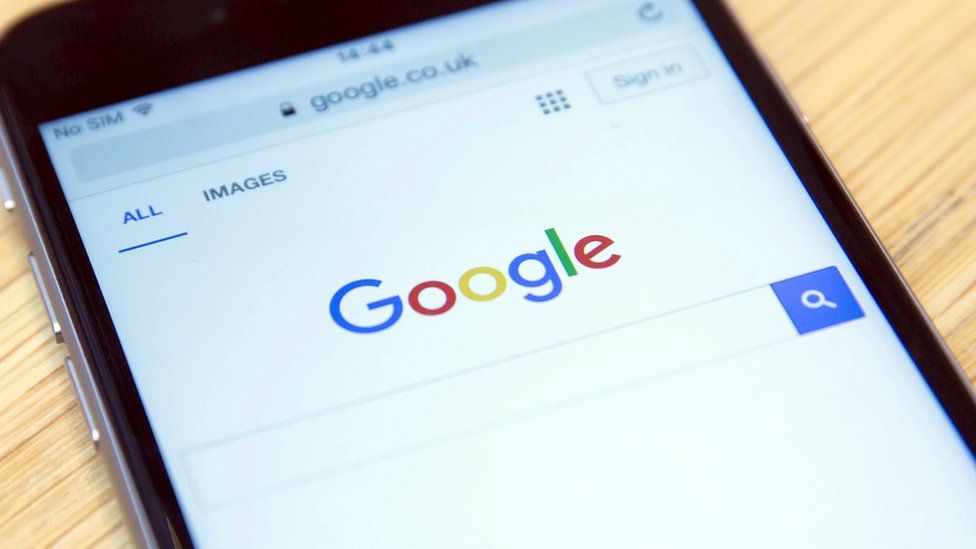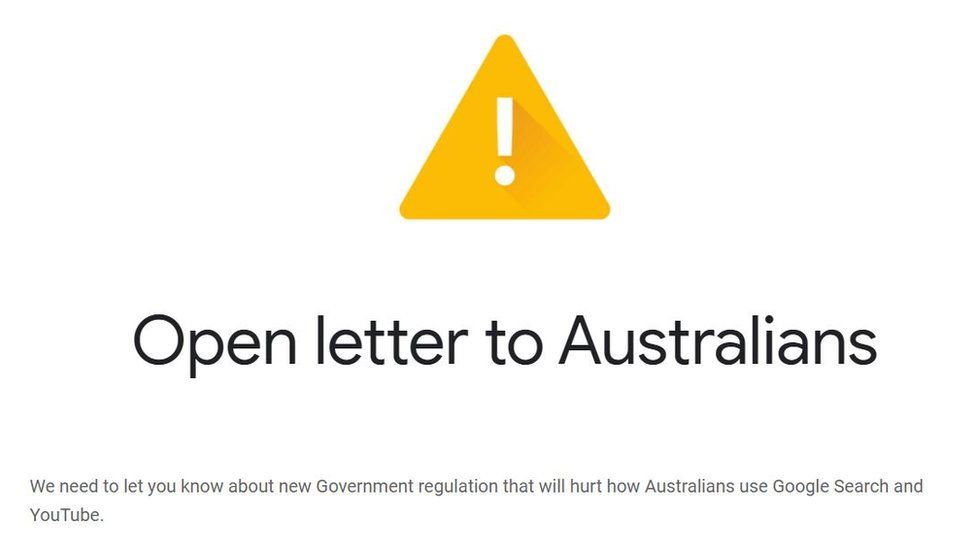Google threatens to withdraw search engine from Australia

Reuters
Google has threatened to remove its search engine from Australia over the nation’s attempt to make the tech giant share royalties with news publishers.
Australia is introducing a world-first law to make Google, Facebook and potentially other tech companies pay media outlets for their news content.
But the US firms have fought back, warning the law would make them withdraw some of their services.
Australian PM Scott Morrison said lawmakers would not yield to “threats”.
Though Australia is far from Google’s largest market, the proposed news code is seen as a possible global test case for how governments could seek to regulate big tech firms.
Australia’s code would tie Google and Facebook to mediated negotiations with publishers over the value of news content, if no agreement could be reached first.
Google Australia managing director Mel Silva told a Senate hearing on Friday that the laws were “unworkable”.
“If this version of the code were to become law, it would give us no real choice but to stop making Google Search available in Australia,” she said.
-
Australia rebukes Google for blocking local search results
- Google accused of misinformation in Australia row
But lawmakers challenged this, accusing Google of “blackmail” and bullying Australia for raising the reform.
“It’s going to go worldwide. Are you going to pull out of every market, are you? Is this about stopping the precedence?” asked Senator Rex Patrick.
Ms Silva replied that the code was “an untenable risk for our Australian operations”.
Mr Morrison said his government remained committed to progressing the laws through parliament this year.
“Let me be clear: Australia makes our rules for things you can do in Australia. That’s done in our parliament,” he told reporters on Friday.
Why is Australia pushing this law?
Google is the dominant search engine in Australia and has been described by the government as a near-essential utility, with little market competition.
The government has argued that because the tech platforms gain customers from people who want to read the news, the tech giants should pay newsrooms a “fair” amount for their journalism.
In addition, it has argued that the financial support is needed for Australia’s embattled news industry because a strong media is vital to democracy.
Australian print media has seen a 75% decline in advertising revenue since 2005, according to the government.
Google’s threat to remove its entire search product is its most severe yet. News accounts for just 12.5% of Google searches in Australia, according to lawmakers.


This is a highly unusual threat.
Google dominates the search engine market with a nearly 90% market share. Almost all its revenue is from ads.
For Google to threaten to pull out of an entire country suggests the company is worried.
Australia is nowhere near its biggest market. But Google execs are fearful about the precedent these new laws could set.
Google has had a very profitable pandemic so far, whilst many local newspapers have struggled. That doesn’t look good – Australian politicians aren’t the first, and won’t be the last, to point that out.
Google says it wants to help fund original, local journalism.
But clearly it believes that what is being proposed in Australia could fundamentally hurt its business model if replicated elsewhere.

What does Google argue?
Ms Silva said the laws would set “an untenable precedent for our businesses and the digital economy” if Google had to pay for link and search results.
This was not compatible with the free-flowing share of information online or “how the internet works”, she argued.

“We do not see a way, with the financial and operational risks, that we could continue to offer a service in Australia,” she said.
Last week, Google confirmed it was blocking Australian news sites from its search results for about 1% of local users. It said it was an experiment to test the value of Australian news services.
Facebook last year also threatened to stop Australian users from sharing news stories on the platform if the law went ahead.
The social media giant repeated that position on Friday, with executive Simon Milner telling the Senate hearing it was “a potential worse-case consequence”.
He said Facebook derived almost no commercial benefit from having news content on its platform.
Both firms have argued that news organisations already get the benefit of platforms driving readers to their websites. Google has also cited its Google News partnership as evidence it supports journalism.

Where the profits go currently
By Katie Silver, business reporter
Australia’s news industry is struggling. Of every A$100 (£56; $77) spent on digital advertising, A$81 goes to Google and Facebook. And Covid-19 has only made this worse.
With companies reducing their digital advertising spend, a number of outlets in Australia have been forced to close.
Google, by contrast, has been performing well. Last year the social media giant made almost $4bn from Australia, while paying $45m in tax.
Meanwhile, Australia’s competition watchdog has accused both Facebook and Google of misleading Australian consumers about how their data is used, launching inquiries into digital advertising and the app stores market.

What’s been the reaction?
Australians have expressed confusion and anger online at both sides over the proposal. Some have debated whether they could get by using other search engines.
Others have questioned if the removal of the search engine would also remove Gmail, Google Maps and Google Home services – something the company has not made clear.
Earlier this week, US trade representatives urged Australia to drop the laws which they said attempted regulation “to the clear detriment of two US firms”.
Sir Tim Berners-Lee, the inventor of the world wide web, said Australia’s plan would make the web “unworkable around the world”.
On Thursday, Google agreed to pay French news publishers for snippets of news stories displayed in search results, after the nation’s media argued copyright law claims.
Published at Fri, 22 Jan 2021 06:23:55 +0000



Comments
Loading…